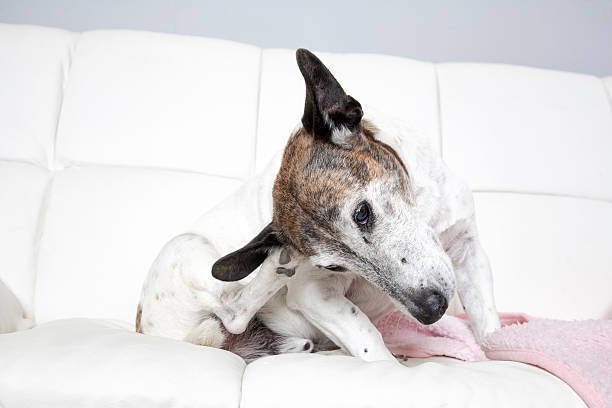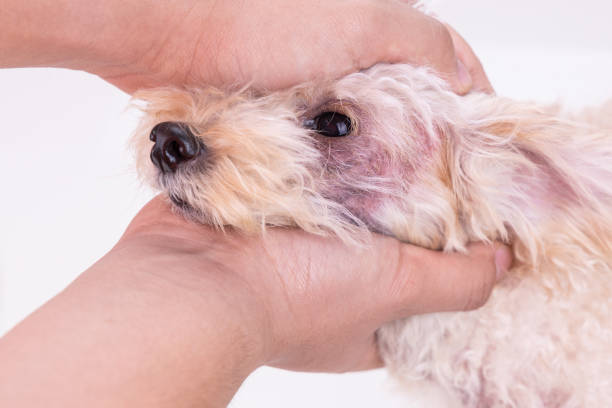Dogs are undoubtedly adorable and alluring but they are not devoid of their flaws. One common issue they often deal with is sneezing. While some dogs may encounter this issue sporadically, others suffer from it consistently requiring medical attention.
It’s important to know what might be causing your dog to start sneezing so you can take appropriate steps to alleviate their symptoms. Dogs who suffer from allergies or viral infections in the nose or sinuses may need medications for symptom relief; dogs under a lot of stress may need behavioural training to reduce their stress levels, and those who have too much hair around their noses may benefit from clipping (or grooming).
The following article explores 12 potential reasons why your dog might be sneezing.


1. Allergies to Grass or Mold
Just as with people, some dogs suffer from allergies that make them sneeze and snort. If you’ve noticed that your dog is sneezing more often on days when the pollen count is high, it may be because they’re allergic to it.
2. A Cold
A cold can cause congestion, runny nose and sneezing. If your dog has been exposed to other dogs or a virus, they may have picked up some bug that’s making them sick.
3. Viral Infection in the Nose or Sinuses
Just like humans, dogs can also have a viral infection. This can make them sneeze and snort because of the congestion that the infection causes around their nose and sinuses.
4. Nasal Mites
If you’ve noticed your dog’s schnoz is extra hairy, there’s a chance they might have nasal mites. These insects live in the hair around a dog’s nose and can cause inflammation, which leads to sneezing.


5. Nasal Polyps
In rare cases, nasal polyps may develop within your pup’s sinuses and lead them to sneeze as well. These growths are noncancerous (benign) but still have to be removed for your dog to be able to breathe easily.
6. Too Much Stress
It’s not uncommon for dogs to sneeze when they’re experiencing too much stress. If you’ve noticed that your pupper starts to sniffle and sneeze when they are anxious, you may want to consider implementing a training program to help reduce their stress.
7. Nasal Cancer
This form of cancer has symptoms that are similar to other nasal and sinus issues. Still, if your dog is going to the bathroom more often than usual or experiencing weight loss as well, you need to see a veterinarian right away. Early detection is key when fighting cancer.
8. Allergic Bronchitis
Another type of allergy that can affect dogs is allergic bronchitis, a reaction to allergens in their environment that causes inflammation in their lungs and sneezing and coughing fits. This makes them sound like they’re hacking up a hairball, but obviously, there’s no fur involved.


9. Congestive Heart Failure
If your dog is also having trouble breathing and coughing up a storm, they might be experiencing congestive heart failure due to their heart not getting enough oxygen to their lungs. This common condition can cause pups to lose weight because of the extra energy they’re spending trying to breathe, and it can also lead them to have a chronic cough.
10. Hereditary Traits
Some dogs are just more susceptible to sneezing than others. If you’ve noticed that your dog (and their parents) always get respiratory issues around certain times of the year, they could be hereditary. They will eventually need medications to combat the breathing problems.
11. Allergies to Food or Treats
If your pup is sneezing a lot after consuming certain foods or treats, it may be because they’re allergic to the ingredients. If you don’t see any other symptoms associated with their allergies, just removing those items from their diet may be enough to keep them comfortable.
12. Pollen Allergies
Just like humans, dogs who are allergic to pollen will often have a sneezing fit when they come into contact with the allergen. This is why you’ll notice their symptoms escalate during the spring and summer months as well as right before fall (when some trees start shedding their leaves).


What can I do if my dog has allergies?
The first thing you should do is take your dog to the veterinarian to be diagnosed with allergies or any other underlying condition. Your vet will determine what type of allergy your dog has and may prescribe medications for emergencies, such as epinephrine injections. They will also let you know about the best possible course of action to combat some of the symptoms that accompany allergies, like itching.
To alleviate some of his allergy symptoms, you may want to try feeding him a high-quality food containing nothing but meat protein so he doesn’t have any reaction from any fillers or preservatives typically found in most pet foods on the market today since these can be allergens themselves. You might also want to opt for grain-free dog food.
Dogs are naturally very clean and don’t want to soil their den, so they spend lots of time grooming themselves. If your dog has allergies, he may become itchy from the dry skin caused by excessive licking. You can try to soothe some of this itching with medicated ointments. If this doesn’t help, you may want to consider switching your dog over to a shampoo free of any dyes or chemicals that can make the itching even worse.
If your dog has allergies and his eyes are itchy, he might start to rub them against furniture or carpeting, which will only make them worse and might cause your dog to scratch them accidentally. Try using some medicated eye wipes to clean around his eyes and keep them from becoming irritated, or try applying a cool compress over the affected area.


If allergies are causing runny noses in dogs, you can try keeping him indoors during terrible allergy days to prevent any allergens related to grass or pollen from travelling through the air and irritating him. If this doesn’t help, you might also want to have your dog’s sinuses irrigated by a veterinarian.
Symptoms of cold in dogs can be treated with plenty of rest and fluids to keep them hydrated. However, if they are still very young or already sick with something else, the cold might bring on additional symptoms. Make sure to monitor your dog closely because they need plenty of time to rest and recover from an illness like this.
After about 10 days, a runny nose in dogs should go away by itself. However, in some cases, allergies can cause a runny nose for as long as 2 months, typically the time needed to recover from an allergic reaction. You can try giving your dog antihistamines during this period, but these won’t actually treat his symptoms. It’s important to be patient with allergies because if they go untreated at first, it can result in more health issues for your dog later on down the line.
How do I know if my dog has respiratory issues?
There are many ways to check to determine whether your dog has a respiratory problem. Firstly, you should note any changes in their appetite or energy levels, as well as the colour and consistency of their stool. Secondly, if they wheeze when breathing, then this indicates lung congestion. Lastly, if they make a honking sound when inhaling and exhaling, this points toward aspiration pneumonia – the fluid that has been sucked into the lungs instead of out through the nose or mouth.
Canine owners must be aware of these symptoms. It could signify an underlying complication such as laryngeal paralysis, which can obstruct airflow into and out of the lungs due to laryngeal collapse.
Dog owners should be aware that their pets are at risk of a range of respiratory conditions, which will likely affect their breathing and how it sounds when they breathe. These conditions can vary from mild to severe, and some can even lead to a complete obstruction of airflow in and out of the lungs.


What can I do if my dog has respiratory issues?
Allergies are caused when a dog develops hypersensitive immune responses (specifically IgE) against substances it’s had contact with in the past and triggers our body’s immune system inappropriately (such as pollen for humans). But since there are many types of allergens and some animals don’t have allergic reactions to all of them, it can be difficult for veterinarians to determine the exact cause.
However, if your dog is suffering from a respiratory infection—which means they have fever as well as mucus and nasal discharges—your pet may have an overactive immune response (similarly to allergies). The immune system in these cases is directed against the pathogens (organisms or infectious agents) that cause respiratory inflammation.
Conclusion
Dogs are prone to various respiratory conditions, varying from mild to severe and even obstructing airflow in the lungs. Canine owners need to be aware of these symptoms to know when to take their dog to see the vet. There are many ways you can check if your dog has any respiratory issues, such as changes in appetite or energy levels, by looking at their stool colour and consistency.
If your pet is suffering from fever with mucus and nasal discharges, then there could be an overactive immune response triggering this illness because they have been exposed to pathogens that cause inflammation. Thankfully most cases will go away on their own within 10 days without treatment; however, if you notice that your dog is sneezing more frequently than usual, it’s important to get them checked out by a veterinarian. They will be able to perform tests and determine the underlying cause of their sneezing fits so they can provide you with the right medical care.


